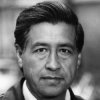Cesar Chavez

Cesar Chavez
Cesar Chavezwas an American labor leader and civil rights activist who, with Dolores Huerta, co-founded the National Farm Workers Associationin 1962. Originally a Mexican American farm worker, Chavez became the best known Latino American civil rights activist, and was strongly promoted by the American labor movement, which was eager to enroll Hispanic members. His public-relations approach to unionism and aggressive but nonviolent tactics made the farm workers' struggle a moral cause with nationwide support. By the late 1970s, his tactics...
NationalityAmerican
ProfessionCivil Rights Leader
Date of Birth31 March 1927
CityYuma, AZ
CountryUnited States of America